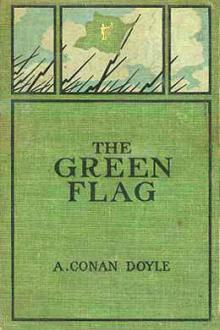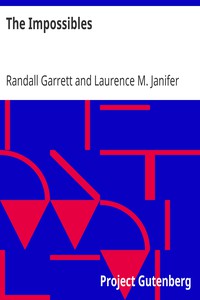That Sweet Little Old Lady, Randall Garrett and Laurence M. Janifer [books to read for self improvement txt] 📗

Book online «That Sweet Little Old Lady, Randall Garrett and Laurence M. Janifer [books to read for self improvement txt] 📗». Author Randall Garrett and Laurence M. Janifer
"Ah," Malone said. "Sure. Of course." He thought rapidly and discovered that he couldn't come up with one more question. As a matter of fact, he'd asked a couple of questions already, and he could barely remember the answers. "Well," he said, "I guess that's about it, then, doctor. If you come across anything else, be sure and let me know."
He leaned across the desk, extending a hand. "And thanks for your time," he added.
Dr. O'Connor stood up and shook his hand. "No trouble, I assure you," he said. "And I'll certainly give you all the information I can."
Malone turned and walked out. Surprisingly, he discovered that his feet and legs still worked. He had thought they'd turned to stone in the office long before.
It was on the plane back to Washington that Malone got his first inkling of an idea.
The only telepath that the Westinghouse boys had been able to turn up was Charles O'Neill, the youthful imbecile.
All right, then. Suppose there were another one like him. Imbeciles weren't very difficult to locate. Most of them would be in institutions, and the others would certainly be on record. It might be possible to find someone, anyway, who could be handled and used as a tool to find a telepathic spy.
And—happy thought!—maybe one of them would turn out to be a high-grade imbecile, or even a moron.

Even if they only turned up another imbecile, he thought wearily, at least Dr. O'Connor would have something to work with.
He reported back to Burris when he arrived in Washington, told him about the interview with Dr. O'Connor, and explained what had come to seem a rather feeble brainstorm.
"It doesn't seem too productive," Burris said, with a shade of disappointment in his voice, "but we'll try it."
At that, it was a better verdict than Malone had hoped for. He had nothing to do but wait, while orders went out to field agents all over the United States, and quietly, but efficiently, the FBI went to work. Agents probed and pried and poked their noses into the files and data sheets of every mental institution in the fifty states—as far, at any rate, as they were able.
It was not an easy job. The inalienable right of a physician to refuse to disclose confidences respecting a patient applied even to idiots, imbeciles, and morons. Not even the FBI could open the private files of a licensed and registered psychiatrist.
But the field agents did the best they could and, considering the circumstances, their best was pretty good.
Malone, meanwhile, put in two weeks sitting glumly at his Washington desk and checking reports as they arrived. They were uniformly depressing. The United States of America contained more subnormal minds than Malone cared to think about. There seemed to be enough of them to explain the results of any election you were unhappy over. Unfortunately, subnormal was all you could call them. Not one of them appeared to possess any abnormal psionic abilities whatever.
There were a couple who were reputed to be poltergeists—but in neither case was there a single shred of evidence to substantiate the claim.
At the end of the second week, Malone was just about convinced that his idea had been a total washout. A full fortnight had been spent on digging up imbeciles, while the spy at Yucca Flats had been going right on his merry way, scooping information out of the men at Project Isle as though he were scooping beans out of a pot. And, very likely, laughing himself silly at the feeble efforts of the FBI.
Who could he be?
Anyone, Malone told himself unhappily. Anyone at all. He could be the janitor that swept out the buildings, one of the guards at the gate, one of the minor technicians on another project, or even some old prospector wandering around the desert with a scintillation counter.
Is there any limit to telepathic range?
The spy could even be sitting quietly in an armchair in the Kremlin, probing through several thousand miles of solid earth to peep into the brains of the men on Project Isle.
That was, to say the very least, a depressing idea.
Malone found he had to assume that the spy was in the United States—that, in other words, there was some effective range to telepathic communication. Otherwise, there was no point in bothering to continue the search.
Therefore, he found one other thing to do. He alerted every agent to the job of discovering how the spy was getting his information out of the country.
He doubted that it would turn up anything, but it was a chance. And Malone hoped desperately for it, because he was beginning to be sure that the field agents were never going to turn up any telepathic imbeciles.
He was right.
They never did.
IIIThe telephone rang.
Malone rolled over on the couch and muttered under his breath. Was it absolutely necessary for someone to call him at seven in the morning?
He grabbed at the receiver with one hand, and picked up his cigar from the ashtray with the other. It was bad enough to be awakened from a sound sleep—but when a man hadn't been sleeping at all, it was even worse.
He'd been sitting up since before five that morning, worrying about the telepathic spy, and at the moment he wanted sleep more than he wanted phone calls.
"Gur?" he said, sleepily and angrily, thankful that he'd never had a visiphone installed in his apartment.
A feminine voice said: "Mr. Kenneth J. Malone?"
"Who's this?" Malone said peevishly, beginning to discover himself capable of semirational English speech.
"Long distance from San Francisco," the voice said.
"It certainly is," Malone said. "Who's calling?"
"San Francisco is calling," the voice said primly.
Malone repressed a desire to tell the voice off, and said instead: "Who in San Francisco?"
There was a momentary hiatus, and then the voice said: "Mr. Thomas Boyd is calling, sir. He says this is a scramble call."
Malone took a drag from his cigar and closed his eyes. Obviously the call was a scramble. If it had been clear, the man would have dialed direct, instead of going through what Malone now recognized as an operator.
"Mr. Boyd says he is the Agent-in-Charge of the San Francisco office of the FBI," the voice offered.
"And quite right, too," Malone told her. "All right. Put him on."
"One moment." There was a pause, a click, another pause and then another click. At last the operator said: "Your party is ready, sir."
Then there was still another pause. Malone stared at the audio receiver. He began to whistle "When Irish Eyes Are Smiling."
"Hello? Malone?"
"I'm here, Tom," Malone said guiltily. "This is me. What's the trouble?"
"Trouble?" Boyd said. "There isn't any trouble. Well, not really. Or maybe it is. I don't know."
Malone scowled at the audio receiver, and for the first time wished he had gone ahead and had a video circuit put in, so that Boyd could see the horrendous expression on his face.
"Look," he said. "It's seven here and that's too early. Out there, it's four, and that's practically ridiculous. What's so important?"
He knew perfectly well that Boyd wasn't calling him just for the fun of it. The man was a good agent. But why a call at this hour?
Malone muttered under his breath. Then, self-consciously, he squashed out his cigar and lit a cigarette while Boyd was saying: "Ken, I think we may have found what you've been looking for."
It wasn't safe to say too much, even over a scrambled circuit. But Malone got the message without difficulty.
"Yeah?" he said, sitting up on the edge of the couch. "You sure?"
"Well," Boyd said, "no. Not absolutely sure. Not absolutely. But it is worth your taking a personal look, I think."
"Ah," Malone said cautiously. "An imbecile?"
"No," Boyd said flatly. "Not an imbecile. Definitely not an imbecile. As a matter of fact, a hell of a fat long way from an imbecile."
Malone glanced at his watch and skimmed over the airline timetables in his mind. "I'll be there nine o'clock, your time," he said. "Have a car waiting for me at the field."
As usual, Malone managed to sleep better on the plane than he'd been able to do at home. He slept so well, in fact, that he was still groggy when he stepped into the waiting car.
"Good to see you, Ken," Boyd said briskly, as he shook Malone's hand.
"You, too, Tom," Malone said sleepily. "Now what's all this about?" He looked around apprehensively. "No bugs in this car, I hope?" he said.
Boyd gunned the motor and headed toward the San Francisco Freeway. "Better not be," he said, "or I'll fire me a technician or two."
"Well, then," Malone said, relaxing against the upholstery, "where is this guy, and who is he? And how did you find him?"
Boyd looked uncomfortable. It was, somehow, both an awe-inspiring and a slightly risible sight. Six feet one and one half inches tall in his flat feet, Boyd ported around over two hundred and twenty pounds of bone, flesh and muscle. He swung a potbelly of startling proportions under the silk shirting he wore, and his face, with its wide nose, small eyes and high forehead, was half highly mature, half startlingly childlike. In an apparent effort to erase those childlike qualities, Boyd sported a fringe of beard and a mustache which reminded Malone of somebody he couldn't quite place.
But whoever the somebody was, his hair hadn't been black, as Boyd's was—
He decided it didn't make any difference. Anyhow, Boyd was speaking.
"In the first place," he said, "it isn't a guy. In the second, I'm not exactly sure who it is. And in the third, Ken, I didn't find it."
There was a little silence.
"Don't tell me," Malone said. "It's a telepathic horse, isn't it? Tom, I just don't think I could stand a telepathic horse—"
"No," Boyd said hastily. "No. Not at all. No horse. It's a dame. I mean a lady." He looked away from the road and flashed a glance at Malone. His eyes seemed to be pleading for something—understanding, possibly, Malone thought. "Frankly," Boyd said, "I'd rather not tell you anything about her just yet. I'd rather you met her first. Then you could make up your own mind. All right?"
"All right," Malone said wearily. "Do it your own way. How far do we have to go?"
"Just about an hour's drive," Boyd said. "That's all."
Malone slumped back in the seat and pushed his hat over his eyes. "Fine," he said. "Suppose you wake me up when we get there."
But, groggy as he was, he couldn't sleep. He wished he'd had some coffee on the plane. Maybe it would have made him feel better.
Then again, coffee was only coffee. True, he had never acquired his father's taste for gin, but there was always bourbon.
He thought about bourbon for a few minutes. It was a nice thought. It warmed him and made him feel a lot better. After a while, he even felt awake enough to do some talking.
He pushed his hat back and struggled to a reasonable sitting position. "I don't suppose you have a drink hidden away in the car somewhere?" he said tentatively. "Or would the technicians have found that, too?"
"Better not have," Boyd said in the same tone as before, "or I'll fire a couple of technicians." He grinned without turning. "It's in the door compartment, next to the forty-five cartridges and the Tommy gun."
Malone opened the compartment in the thick door of the car and extracted a bottle. It was brandy instead of the bourbon he had been thinking about, but he discovered that he didn't mind at all. It went down as smoothly as milk.
Boyd glanced at it momentarily as Malone screwed the top back on.
"No," Malone said in answer to the unspoken question. "You're driving." Then he settled back again and tipped his hat forward.
He didn't sleep a wink. He was perfectly sure of that. But it wasn't over two seconds later that Boyd said: "We're here, Ken. Wake up."
"Whadyamean, wakeup," Malone said. "I wasn't asleep." He thumbed his hat back and sat up rapidly. "Where's 'here'?"
"Bayview Neuropsychiatric Hospital," Boyd said. "This is where Dr. Harman works, you know."
"No," Malone said. "As a matter of fact, I don't know. You didn't tell me—remember? And who is Dr. Harman, anyhow?"
The car was moving up a long, curving driveway toward a large, lawn-surrounded building. Boyd spoke without looking away from the road.
"Well," he said, "this Dr. Willard Harman is the man who phoned us yesterday. One of my field agents was out here asking around about imbeciles and so on. Found nothing, by the way. And then this Dr. Harman called, later. Said he had someone here I might be interested in. So I came on out myself for a look, yesterday afternoon ... after all, we had instructions to follow up every possible lead."
"I know," Malone said. "I wrote them."
"Oh," Boyd said. "Sure. Well, anyhow, I talked to this dame. Lady."
"And?"
"And I talked to her," Boyd said. "I'm not entirely sure of anything myself. But ... well, hell. You take a look at her."
He pulled the car up to a parking space, slid nonchalantly into a slot marked Reserved—Executive Director Sutton, and slid out from under the wheel while Malone got out the other side.
They marched up the broad steps, through the doorway and into the glass-fronted office of the receptionist.
Boyd showed her his little golden badge, and got an appropriate gasp. "FBI," he said. "Dr. Harman's expecting us."
The wait wasn't over fifteen seconds. Boyd and Malone marched down the hall and around a couple of corners, and came to the doctor's office. The door was opaqued glass with nothing but a room number stenciled on it. Without ceremony, Boyd pushed the door open. Malone followed





Comments (0)